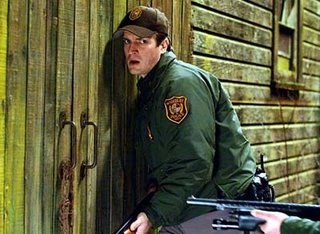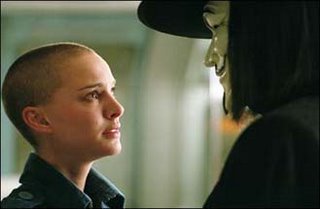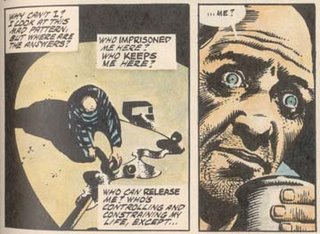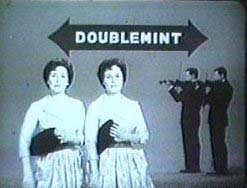
Well, they're certainly talking and writing about
V for Vendetta out there. After the initial rush of excitement, I still think freedom lovers will be talking about this film for years to come and - now that the genie is out of the bottle - governments from this day may be measured by how far they go to destroy
V for Vendetta and any known copies of the movie.
My little attempt to capture my first impressions after coming home from the theater has been joined by some high-powered analysis and discussion (and usually more than one post) by the likes of
Butler Shaffer,
Wally Conger,
Anthony Gregory,
James Leroy Wilson,
Sunni Maravillosa, and a cast of seeming thousands. We all, I think, want one of those masks and a tall hat.
Equally impressive has been the intensity of the backlash by the likes of
Ted Baehr, a new name to me, who sums up the flick as "a vile, pro-terrorist piece of neo-Marxist, left-wing propaganda filled with radical sexual politics and nasty attacks on religion and Christianity," and the Wall Street Journal's
Todd Seavey, who much more thoughtfully dissects the movie and reminds us of the evils of anarchy, which after all brought us "the killing of eight Chicago police officers by anarchists in the 1886 Haymarket Riot, the assassination of President McKinley by an anarchist in 1901 and the murders committed by immigrant Italian anarchists Sacco and Vanzetti in 1920."
It is good, I think, that we are having this discussion and even better that the critics of the film's ideas are so virulent. The theory of action and its equal reaction suggests that
V for Vendetta struck a deep chord, for someone like Baehr to pack no fewer than six negative adjectives and a healthy heaping of bile into his 20-word summary, and for Seavey to spend so much time reminding us how violent some anarchists can be.
After holding out such hope for
Serenity and enduring the tremendous apathy with which that wonderful film was greeted, it is very pleasing to see not only that
V for Vendetta is not being ignored but that close attention is being paid.
Sunni's friend Monika gives us a bit of a reality check in
reminding us that for all of its similarities, America is not quite the world of
V at this time: "The very existence of this blog and the fact that its owner is safe and sound and is about to start a new business venture without having to bribe everyone on the way, is for me a sign that this country is still sooooo far away from anything that feels threatening in such an abysmal country as Belarus."
But it also shows how far we have gone down the wrong road. Just as I get small comfort from the thought that "we may mistreat prisoners of war but at least we don't chop off their heads," it's a comfort but not a great one that the United States of America doesn't abuse its citizens as badly as Belarus does.
There is one phrase that is common to the climaxes of
Serenity and
V for Vendetta: "Stand down." Here is where I am not as optimistic as the writers of these films. Those are the moments in these otherwise true films that don't ring true to me. Yes, the guy faced off the tank at Tiananmen Square - for about a half-hour - and a lot of other people died. The film writers are hoping that these government operatives are as civilized as the British government that eventually stood down against Gandhi's nonviolent advance. Even the British Empire took a few Indian lives before that happened.
But just having the conversation is a wonderful thing. As Wilson put it so beautifully, "I don't speak out against the State because of the probability of success, but because I couldn't live with myself if I didn't."
 I just may go see Slither this weekend, if for no other reason than to see Nathan "Malcolm Reynolds" Fillion in a different role.
I just may go see Slither this weekend, if for no other reason than to see Nathan "Malcolm Reynolds" Fillion in a different role.




























